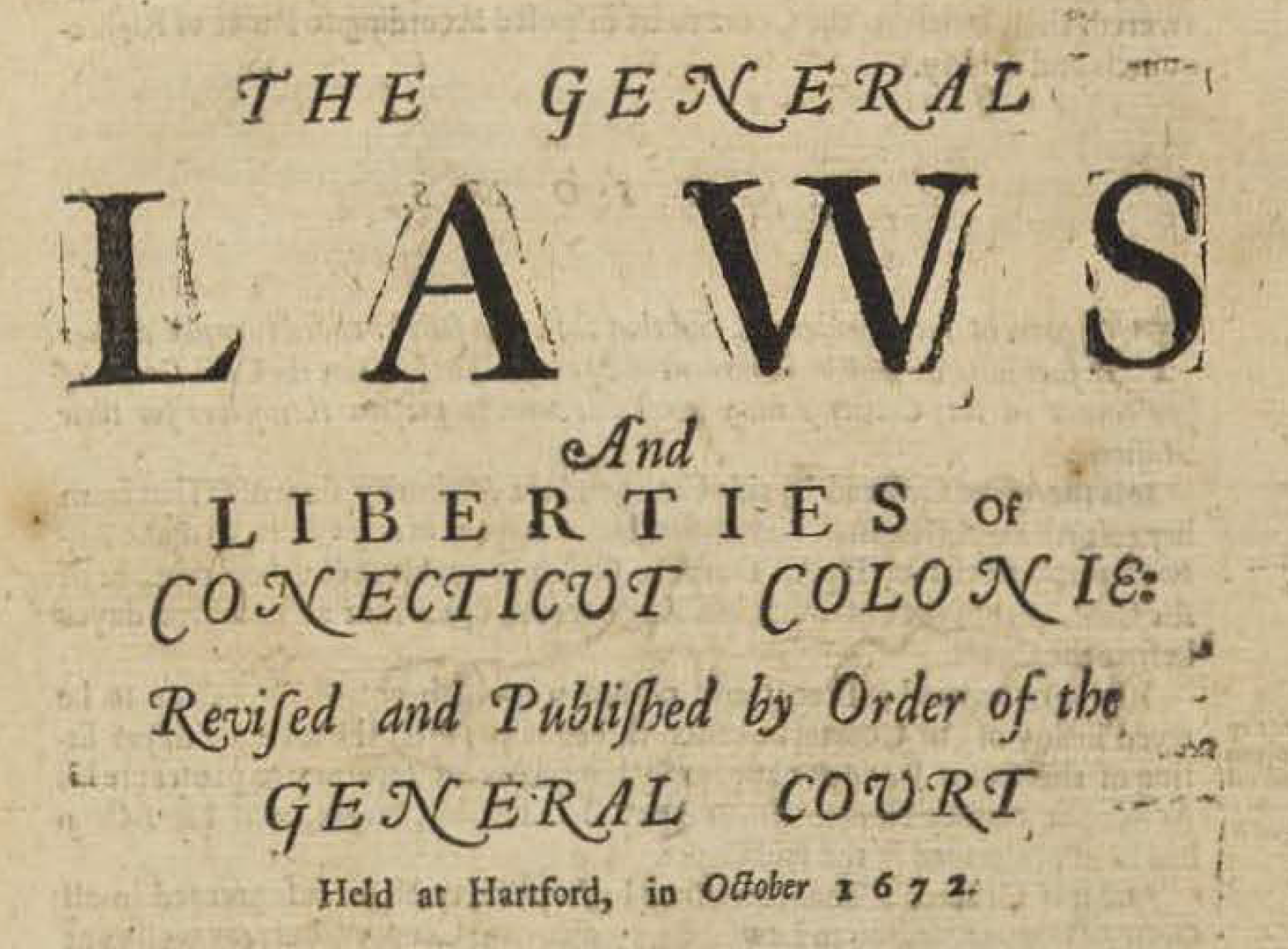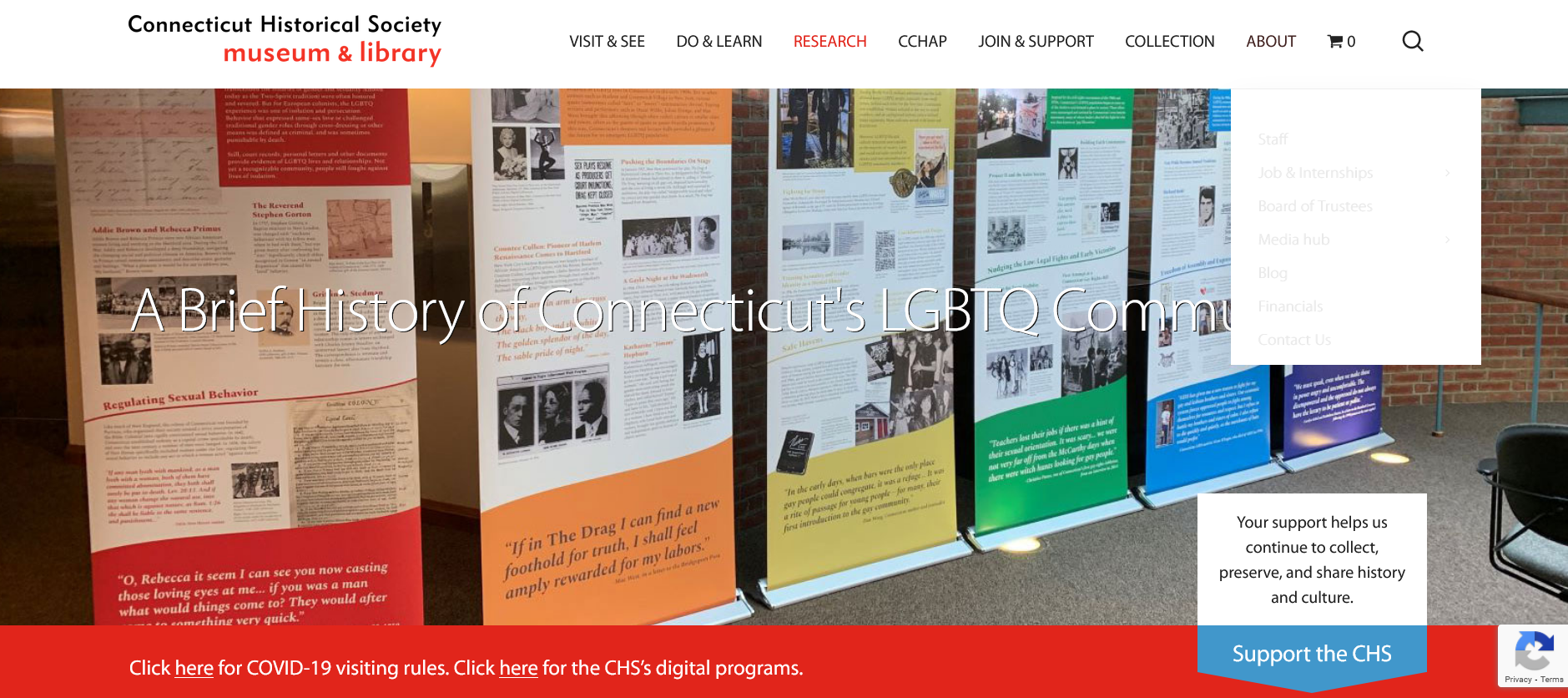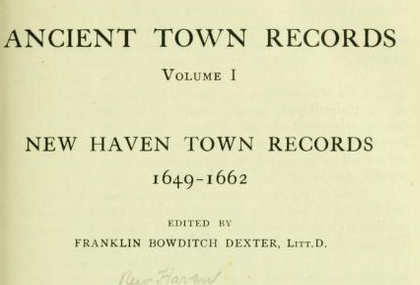Eve Galanis
Graduate Student, American Studies, Trinity College
TEACHER'S SNAPSHOT
Subjects:
Belief & Religion, Colonial History, Crime & Punishment, Law, LGBTQ+ History, Politics & Government
Course Topics/Big Ideas:
Role of Connecticut in U.S. History, The Struggle for Freedom, Equality, and Social Justice
Town:
Hartford, New Haven, New London
Grade:
Grade 8, High School
Lesson Plan Notes
When English colonizers arrived to the shores of what is now New England, many sought freedom to practice Puritan Christianity, away from the influences of the English crown and the Anglican Church. As a result, the laws they wrote reflected their religious and ideological beliefs. Their laws regarding gender and sexuality were especially enduring. These laws marginalized individuals for hundreds of years and continue to influence society today.
ESSENTIAL QUESTION
SUPPORTING QUESTIONS
- Why is it important to examine multiple perspectives when researching U.S. history?
- How did Puritan beliefs influence colonial laws regarding gender and sexuality?
- How does ideology shape and influence the laws and culture of a place?
ACTIVITY
Engage:
Read the following definition of perspective:
Perspective: (noun) a particular attitude toward or way of regarding something; a point of view.
Students will discuss or write responses to the following:
- Why do you think it is important to examine different perspectives when examining history?
- Think about people’s identity markers (e.g. race, gender, religion, etc.) How do you think people’s identities influence their relationship with history?
Explore:
Explore this digital timeline of Connecticut’s LGBTQ+ history. Closely examine the events from 1600-1757.
After you’ve reviewed the timeline, discuss or write responses to the following questions:
- According to the authors of the timeline, how did some Native American nations approach gender and sexuality?
- Describe what happened in New London, 1757.
- Do you think Stephen Gorton’s profession is significant to the story?
Explain:
Examine the laws banning homosexuality in the Connecticut Colony and New Haven Colony. Answer the exploration questions below:
- What are the meanings of these laws? Explain the laws in your own words.
- Examine the language used in the two laws. Are there similarities in the words or phrases used?
- What is the source of the language used in these laws?
- Who suffered as a result of these laws?
- What were the intentions of Puritan colonists in creating these laws?
- How might these laws have influenced the attitudes and actions of the Connecticut and New Haven colonists?
- Do you think these laws are fair? Why or why not?
- What are the qualities of a fair or “just” law?
- What questions do you have?
Read the text from a 1653 case in the New Haven court involving six “youths.” Answer the exploration questions below:
- According to the text, how was the investigation carried out?
- Based on this text, what were the consequences of the New Haven colony law?
- Can you make any guess about why the young men were not executed as the law of the time demanded?
OPPORTUNITIES FOR ASSESSMENT
Evaluate:
- In 3-5 paragraphs, explain what you think life was like for an LGBTQ+ person living in colonial Connecticut. How do you think Puritan ideology influenced people’s views about sexuality and gender? You must at least partly defend your claims using historical information from the sources. You may also bring in more recent information as appropriate.
- Students will write a short work of historical fiction (2-4 pages) describing the experience of an LGBTQ+ person living in colonial Connecticut. You must use at least one of the sources provided in your short story. You may also bring in other primary and secondary sources as appropriate.
The length of these assignments can vary. Teachers should use their best judgment to differentiate.
Extension Activity:
Read and analyze this article about the life of Reverend Stephen Gorton using the National Endowment for the Humanities Secondary Source Analysis Worksheet to organize your thoughts. You will use your secondary source analysis to construct a short essay or work of historical fiction.
RESOURCE TOOL KIT

New Haven Colony law banning homosexuality (1656)
Records of the colony or jurisdiction of New Haven, from May, 1653, to the union. Together with New Haven code of 1656. Hoadly, Charles J. (Charles Jeremy), 1828-1900, ed. Hartford: 1858. Harvard University, courtesy Internet Archive.
Transcription of the excerpt:
“If any man lyeth with mankind, as a man lyeth with a woman, both of them have committed an abomination, they both shall surely be put to death. Lev. 20:13. And if any woman change the natural use, into that which is against nature, as Rom. I: 26 she shall be liable to the same sentence, and punishment…”
View the full volume here.

Connecticut Colony law banning homosexuality (1672):
“The General Laws and Liberties of Connecticut Colonie: Revised and Published by Order of the General Court Held at Hartford, in October 1672: Capital Laws.” The Book of the General Laws for the People within the Jurisdiction of Connecticut: Collected out of the Records of the General Court, lately revised. Connecticut General Court. 1673.
Transcription of the excerpt:
“7. If any man lyeth with Man-kind as he lyeth with a Woman, both of them have committed an abomination, they both shall surely be put to death, except it appear that one of the parties were forced, or under fifteen years of age. Levit. 20:13.”
View the full volume here.

Historic Timeline of Connecticut’s LGBTQ Community, Connecticut Museum of Culture and History.

“A Meeting of Ye Court Extraordinary, March 23, 1652.”
Franklin Bowditch Dexter, ed., New Haven Town Records, 1649-1684 (New Haven: New Haven Historical Society, 1917), pp. 178-79.
The court records of the town of New Haven reported the sentencing of six young males, and a servant, John Clarke, who was returned to his master for punishment.
Transcription:
“Upon a complaint made to the Governor of sundrie youths in the Town that had committed much wickedness in a filthy corrupting way one with another, they were called before the Governor and Magistrates…. [Those charged were] Benjamin Bunill, Joshua Bradly, Joseph Benham, William Trobridg, Thomas Tuttill & Thomas Kimberly. They were examined in a private way, and their examinations taken in writing, which were of such a filthy nature as is not fit to be made known in a public way: after which the Court were called together, and the youths before them. Their examinations were read and, upon their several confessions, the Court . . . sentenced the youths above named to be whipped publicly. And whereas John Clarke, servant to Jeremiah Whitnell, was questioned and charged by one of them for some filthy carriage, he denied it, and another of the company in some measure cleared him from that the other charged him with, whereupon he was not sentenced to be corrected publicly, but the Court left it with his master to give him that correction in the family which he should see meet [proper], warning John Clarke that if ever any such carriage came forth against him hereafter, the Court would call these miscarriages charged upon him to mind again.”
View the full volume here.
ADDITIONAL RESOURCES
Places to GO
GLBTQ+ Archives, Central Connecticut State University Library
Connecticut State Library, Hartford
Things To DO
If your school does not have an LGBTQ+ organization club, consider forming one. Allyship and visibility is essential to promoting human rights and protecting LGBTQ+ youth from bullying and discrimination. How to Start a Gay-Straight Alliance (GSA), ACLU.
If you want to investigate LGBTQ+ history even further, check with your local historical society or library. LGBTQ+ historical research is challenging, especially the further back into history you go. Here is a guide to help you with your research: How to Look for Records Of: Sexuality and Gender Identity History.
Note: While this source provided specifically grapples with UK-based history, the article is useful to help you identify and search for key terms pertaining to LGBTQ+ history.
Watch a video:
- “The Homophobic Origins of U.S. Law,” PBS. (11:37)
- “Two- Spirit People,” Frameline. (22:51)
It is important to note that there is limited evidence of two-spirit tradition in Connecticut.
Listen to a podcast:
- “Examining Connecticut’s LGBTQ+ History,” Where We Live, WNPR
- “Uncovering Connecticut’s LGBTQ+ History,” Connecticut Explored
Websites to VISIT
Historic Timeline of Connecticut’s LGBTQ Community (1600-present), Connecticut Museum of Culture and History
History Day LGBTQ+ Topics, Connecticut State Library
Life During the American Revolution: Resources for Students and Educators: Queer People in Colonial History, New York Public Library
LGBTQ History Timeline Reference, GLSEN
LGBTQ History in the United States, Elon University
Articles to READ
Pagett, Donald. “Colonial Williamsburg is Uncovering America’s Hidden Queer History.” Out Traveler, August 11, 2021.
Chevat Richie, Michael Bronski. “Queer History: The Gender-Free Revolutionary of 1776.” Yes Magazine, June 30, 2019.
“Two-Spirit People of the First Nations.” Rainbow Resource Center
ConnecticutHistory.org:
- “What’s a Puritan, and Why Didn’t They Stay in Massachusetts?” by Walter Woodward.
- “The Importance of Being Puritan: Church and State in Colonial Connecticut” by Nancy Finlay.



